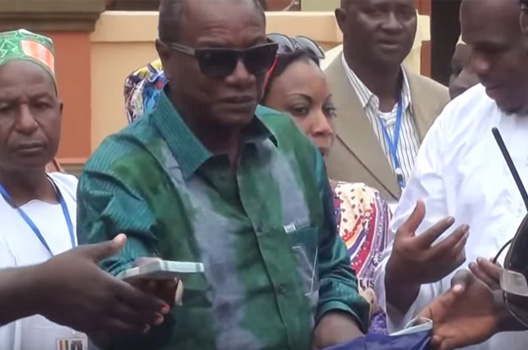 For months, I have been warning that Guinea’s young democracy was extraordinarily fragile and might well prove stillborn. Last month, I highlighted the broader significance of next week’s presidential election, noting that its conduct will either consolidate the major advance for democracy in Africa achieved earlier this year when the continent’s most populous country and largest economy, Nigeria, had a peaceful transfer of power following the first-ever electoral defeat of an incumbent president in its history or, conversely, deal a devastating setback to a fragile West African subregion just emerging from long years of conflict and still reeling from last year’s Ebola epidemic. Unfortunately, with just days before the vote, there are troubling signs that incumbent President Alpha Condé may be pulling out all stops to ensure that he won’t have to vacate the office he has long sought and which he gained only in 2010 following a highly disputed poll.
For months, I have been warning that Guinea’s young democracy was extraordinarily fragile and might well prove stillborn. Last month, I highlighted the broader significance of next week’s presidential election, noting that its conduct will either consolidate the major advance for democracy in Africa achieved earlier this year when the continent’s most populous country and largest economy, Nigeria, had a peaceful transfer of power following the first-ever electoral defeat of an incumbent president in its history or, conversely, deal a devastating setback to a fragile West African subregion just emerging from long years of conflict and still reeling from last year’s Ebola epidemic. Unfortunately, with just days before the vote, there are troubling signs that incumbent President Alpha Condé may be pulling out all stops to ensure that he won’t have to vacate the office he has long sought and which he gained only in 2010 following a highly disputed poll.
First, notwithstanding a deal struck with political opposition parties in August, sufficient new officials have not been installed who would give Condé’s opponents representation in local and regional government bodies. These last-minute appointments would not be necessary were it not for the fact that Guinea has not had local elections since 2002 and a new vote has been postponed on one pretext or another throughout Condé’s presidency, notwithstanding an agreement brokered by United Nations envoy Said Djinnit in 2013 that guaranteed that the elections would take place within the first three months of 2014. In fact, earlier this year, the president’s handpicked electoral commission pushed the date for local polls off yet again, this time until 2016. Not only is there is no basis in the Guinean constitution for these repeated delays, but the current batch of unelected local officeholders, who are supposed to administer the upcoming presidential vote at the grassroots level, can hardly be expected to be neutral in the contest, owing as they do their very livelihoods on extra-legal appointments by the incumbent head of state.
Second, apparently the built-in advantages of incumbency and having control of local officials is not sufficient assurance for the widely-criticized Condé, who has been filmed by investigative journalists from independent local media outlet GuineéMatin handing out bundles of cash from a plastic bag while out on the campaign trail (presidential spokesmen tried to explain that the president was a big tipper and that the money was for musicians serenading him). It is not clear who the recipients of the money are, much less the source of the funds, but tellingly French media reported this week that the French government’s major financial crimes agency (OCRGDF) has opened an investigation into the affairs of the Guinean president’s son and political advisor, Mohamed Alpha Condé, who is alleged to receive kickbacks from French companies invested in Guinea’s mining sector.
Third, despite the government’s undertaking in the August accord to speed up the cleaning of the voter rolls—and, more importantly, to do so in a transparent, consensual manner—as well as distribute the voter identification cards, neither process has gotten very far. In fact, on Thursday, all seven opposition presidential candidates called for a one-week postponement of the presidential election to at least allow for the identification documents to be distributed, a request that the Condé camp has so far refused. However, as one opposition spokesman told RFI, “The postponement of at least one week would be a solution that could minimize the damage. We know how important it is to have an election in which the process is transparent enough to promote calm and social peace in our country.”
Fourth, Guinea’s communications regulator issued an order this week banning the publication of any election results, partial or otherwise, until the official results are released. Disturbingly, the decree applies the country’s mobile telephone operators, who were ordered not to transmit via SMS the “parallel tallies” which civil society activists have used throughout Africa to keep ballot counts honest, as showcased during the landmark Nigerian elections earlier this year, when the Transition Monitoring Group and other nongovernmental organizations deployed tens of thousands of observers across the country who fed local vote tallies to a national “situation room.” Frank Engel, head of the European Union’s election monitoring team in Guinea, among others, has expressed concerned about the resulting “limitations on freedom of expression and communication,” to say the least.
Biased election administrators, dirty money, disputed voter lists, missing voter documents, and bans on communications are hardly the stuff of a credible election, much less the foundation of politically legitimacy for its eventual “winner.”
J. Peter Pham is Director of the Atlantic Council’s Africa Center.
Image: Photo: Shades of Conde via YouTube
